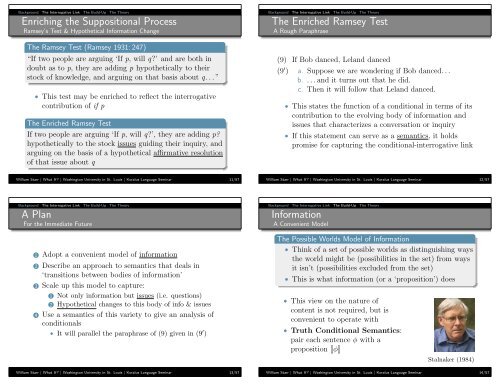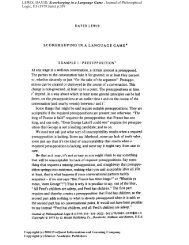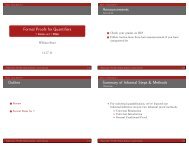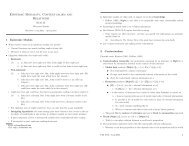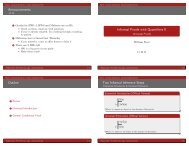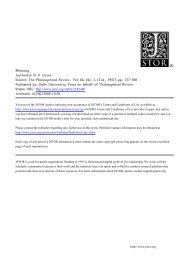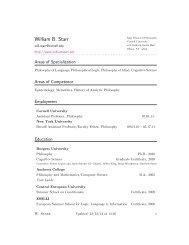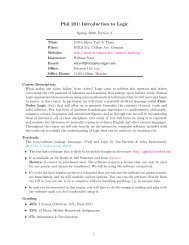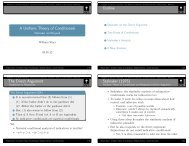What If? - Will Starr
What If? - Will Starr
What If? - Will Starr
You also want an ePaper? Increase the reach of your titles
YUMPU automatically turns print PDFs into web optimized ePapers that Google loves.
Background The Interrogative Link The Build-Up The Theory<br />
Enriching the Suppositional Process<br />
Ramsey’s Test & Hypothetical Information Change<br />
The Ramsey Test (Ramsey 1931: 247)<br />
“<strong>If</strong> two people are arguing ‘<strong>If</strong> p, will q?’ and are both in<br />
doubt as to p, they are adding p hypothetically to their<br />
stock of knowledge, and arguing on that basis about q. . . ”<br />
• This test may be enriched to reflect the interrogative<br />
contribution of if p<br />
The Enriched Ramsey Test<br />
<strong>If</strong> two people are arguing ‘<strong>If</strong> p, will q?’, they are adding p?<br />
hypothetically to the stock issues guiding their inquiry, and<br />
arguing on the basis of a hypothetical affirmative resolution<br />
of that issue about q<br />
Background The Interrogative Link The Build-Up The Theory<br />
The Enriched Ramsey Test<br />
A Rough Paraphrase<br />
(9) <strong>If</strong> Bob danced, Leland danced<br />
(9 ′ ) a. Suppose we are wondering if Bob danced. . .<br />
b. . . . and it turns out that he did.<br />
c. Then it will follow that Leland danced.<br />
• This states the function of a conditional in terms of its<br />
contribution to the evolving body of information and<br />
issues that characterizes a conversation or inquiry<br />
• <strong>If</strong> this statement can serve as a semantics, it holds<br />
promise for capturing the conditional-interrogative link<br />
<strong>Will</strong>iam <strong>Starr</strong> | <strong>What</strong> <strong>If</strong> ? | Washington University in St. Louis | Koralus Language Seminar 11/57<br />
<strong>Will</strong>iam <strong>Starr</strong> | <strong>What</strong> <strong>If</strong> ? | Washington University in St. Louis | Koralus Language Seminar 12/57<br />
Background The Interrogative Link The Build-Up The Theory<br />
A Plan<br />
For the Immediate Future<br />
1 Adopt a convenient model of information<br />
2 Describe an approach to semantics that deals in<br />
‘transitions between bodies of information’<br />
3 Scale up this model to capture:<br />
1 Not only information but issues (i.e. questions)<br />
2 Hypothetical changes to this body of info & issues<br />
4 Use a semantics of this variety to give an analysis of<br />
conditionals<br />
• It will parallel the paraphrase of (9) given in (9 ′ )<br />
Background The Interrogative Link The Build-Up The Theory<br />
Information<br />
A Convenient Model<br />
The Possible Worlds Model of Information<br />
• Think of a set of possible worlds as distinguishing ways<br />
the world might be (possibilities in the set) from ways<br />
it isn’t (possibilities excluded from the set)<br />
• This is what information (or a ‘proposition’) does<br />
• This view on the nature of<br />
content is not required, but is<br />
convenient to operate with<br />
• Truth Conditional Semantics:<br />
pair each sentence φ with a<br />
proposition φ<br />
Stalnaker (1984)<br />
<strong>Will</strong>iam <strong>Starr</strong> | <strong>What</strong> <strong>If</strong> ? | Washington University in St. Louis | Koralus Language Seminar 13/57<br />
<strong>Will</strong>iam <strong>Starr</strong> | <strong>What</strong> <strong>If</strong> ? | Washington University in St. Louis | Koralus Language Seminar 14/57


